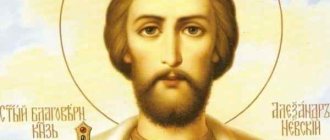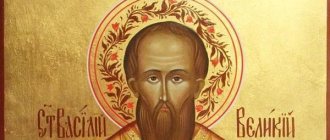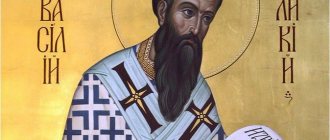Collection - Lenten Triodion (Russian translation)
1 …119
THE WEEK ABOUT THE COLLECTOR AND THE PHARISEE
ON SATURDAY AT GREAT VESPERS
After the opening psalm, we read the entire first kathisma. to the Lord: I sing stichera on 10: three Sunday Octoechos, 4 eastern ones and two self-consonant ones from the Triodion, repeating the first twice:
Voice 1
Let us not pray like a Pharisee, brothers: / for he who exalts himself will be humiliated. / Let us humble ourselves before God, / like a tax collector during the days of fasting, crying out: / “Be merciful, O God, to us sinners!” (2)
The Pharisee, overcome by vanity, / and the publican, bowed to repentance, / approached You, the One Master: / but one, having boasted, lost his benefits, / the other, without many words, was awarded gifts. / In those groanings, strengthen me, O Christ God, / as a Lover of mankind.
Glory, voice 8: Almighty, Lord, / I know how much tears can bear: / for they raised Hezekiah from the gates of death, / they delivered a sinner from long-term sins, / they justified the publican more than the Pharisee; / and I ask: / “Having counted me among them, have mercy on me!”
And now, Theotokos: a dogmatist of the ordinary voice.
At the Litiya of the temple stichera
Glory, voice 3: Having understood the difference between the tax collector and the Pharisee, my soul, / hate the first’s arrogant voice, / but be jealous of the second’s prayer with good contrition and cry out: / “God, have pity on me, a sinner, and have mercy on me!”*
And now, the Theotokos Sunday in the same voice
Stichera on the verse of Octoechos
Glory, voice 5: With my eyes, burdened with my iniquities, / I cannot look up and see the heights of heaven; / but accept me as a repentant publican, O Savior, / and have mercy on me.
And now, Mother of God, voice 5: Temple and door, palace and throne of the King, - / You, venerable Virgin; / through You, my Redeemer, Christ the Lord, / appeared to those sleeping in darkness, like the Sun of righteousness, / wanting to enlighten those whom He created / with His hand in His image. / Therefore, O All-Glorified One, / who acquired maternal boldness towards Him, / constantly intercede / for the salvation of our souls.
AT MORNING
After the Six Psalms , God is the Lord: in the voice of the Octoechos, we sing the Sunday troparion twice, and the Theotokos once. Then the usual verse of the Psalter. Sedalny Oktoeha. After the “Immaculates” troparia: Angelic host: Ipakoi. Grave and Prokeimenon voices. Every Breath: The Sunday Gospel Ordinary. Resurrection of Christ: Psalm 50.
Glory, voice 8: Open the gates of repentance / to me, Giver of life, / for since dawn my spirit has been striving / to Thy holy temple, / bearing the entire desecrated bodily temple. / But You, as a compassionate one, cleanse him / with Your merciful mercy.
And now, Mother of God: Guide me on the path of salvation / guide me, Mother of God / for I have stained my soul with shameful sins / and frivolously wasted my whole life. / But through Your prayers / deliver me from all uncleanness.
Also, voice 6: Have mercy on me, O God, according to Your great mercy / and according to the multitude of Your compassions blot out my iniquity.
Reflecting on the many grave sins I have committed, / I, unfortunate one, tremble before the terrible day of judgment. / But, hoping for the mercy of Your mercy, / like David I cry to You: / “Have mercy on me, O God, / according to Your great mercy!”
The first canon is Sunday at 4, the second is Cross and Sunday at 2 and the third is the Theotokos at 2, and the Triodion at 6: the creation of George. Acrostic poem named after him in the Mother of God.
Canon, creation of George, tone 6 Song 1
Irmos: How Israel walked overland:
By means of parables, leading everyone / to the correction of life, / Christ exalts the publican for his humility, / showing the Pharisee also with the exaltation of the humble one.
Out of humility, seeing elevating honor, / from exaltation, a heavy fall, / be jealous of the virtues of the tax collector, / and hate the wickedness of the Pharisees.
From recklessness all good becomes vain, / from humility all evil is destroyed; / Let us love him, faithful ones, / sincerely abhorring the behavior of the vain.
Wanting to see His disciples humble, / the King convinced everyone and taught them to be jealous / of the publican’s groaning and his humility.
Glory: Like a publican I groan, / and with incessant sobs, Lord, / now I come to Your mercy: / have pity on me, / who now live their lives in humility!
And now, Mother of God: Mind, will, hope, / body, soul and spirit, Lady, / I entrust to You: / from evil enemies, and temptations, and future punishment, / deliver and save me.
Katavasia: I will open my mouth:
Song 3
From dirt and passions / the humble rises, / but from the heights of virtues falls miserably / everyone with a proud heart: / we flee from his character, from vice!
Vanity makes vain the wealth of righteousness, / but humility scatters the multitude of passions; / us, who imitate him, / become fellow publicans, O Savior.
Like the publican, we too, striking ourselves on the chest, / will cry out in contrition: / “Be merciful, O God, to us sinners!” / – in order to receive remission for this.
Let us approach with zeal, faithful ones, / achieving meekness, living with humility, / in groaning of the heart and weeping with prayer, / so that we may find forgiveness from God.
Glory: Let us reject, faithful, the arrogant boasting, / and the immeasurable recklessness, / and the vile arrogance, / and the most vile before God / the obscene heartlessness of the Pharisee.
And now, Mother of God: Confident in You, my only refuge, / may I not be deprived of good hope, / but may I receive help from You, Pure, / freeing myself from all harm and disasters.
Sedalny, voice 4
Humility elevated / the publican defiled by evil deeds, / sad and “Have mercy!” to the Creator who called; / the exaltation brought down, depriving the righteousness / of the pathetic Pharisee who had exalted himself. / So let us be jealous of good deeds, / moving away from evil ones.
Glory: Humility once exalted / the publican, who cried out with tears: “Have mercy!” / and justified him. / Let us imitate him / all who have fallen into the depths of evil, / let us cry out to the Savior from the depths of our hearts: / “We have sinned, only Lover of Mankind, have mercy!”
And now, Mother of God: Accept quickly, Lady, our prayers / and bring them to Your Son and God, Lady All-Immaculate. / Resolve the disasters of those who resort to You, / crush the intrigues and overthrow the insolence of the godless, / who arm themselves against Your servants.
Song 4
The excellent way of exaltation is humility, / showed the Word, / humbled even to the image of a slave: / imitating this, everyone is exalted, humbled.
The righteous Pharisee ascended and fell; / the publican, burdened with many vices / humbled himself, but was exalted, / receiving justification beyond hope.
To those who bring poverty, / despite the abundance of virtues, / recklessness appeared; / and humility, on the contrary, is the acquisition of justification, / despite extreme poverty. / Let's buy it!
You have predicted, O Lord, / that you resist the highly intelligent in every possible way, / but give your grace to the humble, O Savior; / now to us who have humbled ourselves, / send down Thy grace.
Glory: Always raising us to divine heights, / the Savior and Master showed elevating humility: / for the feet of the disciples / He washed with His own hands.
And now, the Mother of God: Like the Unapproachable Light, who gave birth to the darkness of my soul with a bright radiance, Virgin, scatter, / and direct my life to the paths of salvation.
Song 5
Let us try to imitate the virtues of the Pharisees, / and be jealous of the humility of the publican, / hating the evil in both of them: / the recklessness and destruction of sin.
The running of righteousness is exposed as futile: / for the Pharisee combined conceit with it; / the publican, on the contrary, took as his companion / an uplifting virtue - humility.
How a charioteer races in virtue, thought the Pharisee; / but we were on foot competing with a fast chariot, / the publican successfully outstripped him, / combining humility with a pitiful cry.
Having understood everything with our minds about the parable of the publican, / let us mourn with tears, / offering a contrite spirit to God, / when we seek remission of sins.
Glory: Proud and vicious, arrogant and impudent / let us, reasonable ones, cast aside far away the Pharisees’ character, terribly arrogant, / so as not to deprive us / of divine grace.
And now, Mother of God: Send down the Rod of Power, Good, / to all of us who resort to You, / giving us dominion among all enemies / and delivering us from all harm.
Song 6
The publican and the Pharisee walked the path of life together: / but one, carried away by recklessness, / suffered a shameful wreck, / the other was saved by humility.
We, changing our lives towards righteousness, / will imitate the procession of the publican, / his enviable way of thinking: / but we will flee from the vile arrogance of the Pharisee / and we will live.
1 …119
The Lenten Triodion - a guide through Great Lent
The famous liturgist A.A. Dmitrievsky once wrote that contemporary Christians had almost completely lost their correct understanding of Great Lent1. Alexey Afanasyevich found the reason very interesting: people’s ignorance of the texts of the main liturgical book of the Holy Pentecost - the Lenten Triodion. This opinion was expressed at the beginning of the 20th century. It seems that the words of the Orthodox scientist are quite applicable to our time. Alas, even today few church people are well acquainted with the unique patristic creation that forms the basis of Lenten worship. But indeed, the Triodion, open on any page, breaks many stereotypes about the meaning of fasting and instills a completely different experience of fasting in comparison with what we sometimes have.
* * *
When familiarizing yourself with the verses of the Triodion, what first surprises you is some kind of unearthly, flighty joy flowing from all the chants. The texts seem to be repentant, but there is quite an Easter rejoicing visible in them! For example, here is the stichera of Monday of the first week of Lent: “We will begin all-honorable abstinence with light, shining with rays of the holy commandments of Christ our God, love with brilliance, prayer with brilliance, purity with purification, goodness with strength; for let us bring light before the holy and three-day resurrection, illuminating incorruption to the world.”2 A whole stream of dazzling light is poured on us: “light”, “shining with rays”, “brightness”, “brilliance”, “luminiferous”, “illuminating”. The general intonation of the stichera is festive. I immediately remember the words of the Savior, read by the Church before the beginning of Lent, on Forgiveness Sunday: When you fast, do not be sad, like the hypocrites, for they take on gloomy faces in order to appear to people as fasting. Truly I tell you that they are already receiving their reward. And you, when you fast, anoint your head and wash your face (Matt. 6:16-17). The Triodion, confirming the teaching of the Lord, also tells us that for a Christian, fasting is a spiritual holiday.
* * *
The main liturgical book of Great Lent is thoroughly imbued with biblical associations and meanings. In this respect these texts can be called a great school of exegesis. For example, this is how St. Petersburg is interpreted in the canon. Andrew of Crete, the bigamy of Patriarch Jacob: “I understand that I am two wives, but action and reason are in sight, Leah is an act of slaughter, like one with many children; Rachel's mind is like a lot of work; for apart from labor, neither the deed nor the sight of the soul will be corrected.”3 It turns out that the patriarch's two wives are important symbols.
“Leah symbolizes that part of the human soul that gives its strength to earthly, sensual life. ...Labor, action (Leah) is something in which a person apparently manifests himself on the outside. And the fruits of the work of these hands are so innumerable that the monk compares them with Leah, as if she had many children - after all, indeed, she gave birth to Jacob more than all the children, while Rachel - only two (Joseph and Benjamin), but at least the closest and most comforting. But Leah, as the book of Genesis specifically points out to us, is “weak in the eyes”: work in itself, not animated by any higher aspiration, turns into a tedious task of obtaining food, and a person who works like this is not much different from those animals that the Lord created before him, without, however, breathing into them the “breath of life” from His Spirit (cf. Gen. 1:20–25, 2:7).”4
Every page of Scripture is relevant to the person trying to live a spiritual life
Or, for example, the hand of Moses, which turned white from leprosy and was then healed by the Lord (cf. Ex. 4:6-7). The Triodion explains that this sign relates to our Christian life: “Let the hand of Moses assure us, O soul, how God can whiten and cleanse the life of a leper, and do not despair of yourself, even if you are a leper.”5 How many of us would have guessed that the leprosy on Moses' hand indicates our sins? Here and in a number of other cases, Lenten texts prove that every page of Holy Scripture is relevant for every person trying to lead a spiritual life.
And it happens that this or that stichera is entirely woven from passages of the Bible, and the lover of the Book of Life listens with pleasure to these lines, born of the great love of the holy fathers for Scripture. For example: “It is an acceptable time, the day of salvation, let us bring to God the gifts of virtues, in which we have put aside the works of darkness, brethren, let us put on the armor of light, as Paul cries out.”6
By the way, one more thing about the Bible. Triodion shows an excellent example of the interest of the holy fathers not only in the New, but also in the Old Testament. Most of the biblical semantic allusions in the Great Canon are taken from the Old Testament books. Charter biblical readings of the Triodion - Genesis, Isaiah, Proverbs. A rare stichera does not refer us to certain names or events of Old Testament history. How sad it is that Christians of the first millennium knew and loved the Old Testament books, reading them in a Christian way, but a modern Orthodox person sometimes does not understand why he should read Moses or Isaiah. One sometimes even hears from teachers of seminaries and academies that the Old Testament is a shadow of the New, and therefore reading it is not at all necessary for a Christian. However, the Lenten Triodion smashes such theses to smithereens.
All books of the Bible are interconnected, and among them there are no superfluous ones
The Holy Scriptures of the Old and New Testaments are one book with internal integrity. All books of the Bible are interconnected, and none of them are superfluous. We will never understand the New Testament without the Old, and the Old without the New. The amazing interweaving of the meanings of the Old Testament and New Testament books, revealed in Triodion, shows a true Christian attitude towards biblical books. In the Bible everything is one: one explains the other, the first is fulfilled in the second, and the second and first are contained in something third. Some link has fallen out - and perception is already impaired.
* * *
Perhaps the most precious meaning of the Triodion is that it conveys the bitter truth about man - one that no one except the Church will tell us. In describing the spiritual state of the sinner, the Triodion is radical to the extreme: “There was no sin in life, no deed, no malice, even though I, the Savior, have not sinned in mind, and in word, and in will, and in sentence, and in thought, and in deed, having sinned, as and no one else ever"7. It turns out that I am guilty of all sins? Yes exactly. In my heart I carry the imprints of all the sins of the world - as potential, as possibility. If I have not sinned in something in deed, then I have sinned in word; if not in word, then in thought; and if not by thought, then by the secret wishes of the heart. If in fact I did not sin in one way or another, it is only because God saved me from such a situation in which I would not have withstood the temptation and fell. The texts of the Holy Pentecost remind us of the depth of our infection with sin in order to evoke in us a corresponding depth of repentance.
The texts of the Holy Pentecost remind us of the depth of our infection with sin
But along with severe denunciations, the Triodion always gives a warm light of hope, constantly reminding us of the approaching Easter: “Having put off the filthy garments of intemperance, let us put on the bright robe of abstinence, and we will achieve the rebellion of the former, bright Savior.”8
* * *
I don’t know how similar the ills of church society at the beginning of the 20th century and the 21st century are, but Dmitrievsky’s concern about the poor knowledge of the Triodion by Orthodox people can be shared even now. Yes, ignorance of this book greatly impoverishes us and in many ways deprives our Christianity of the joy of repentance, the beauty of theology, and biblical breadth.
Well, Lent has just begun, and the Holy Triodion has still turned a few pages. It’s just time to pick up this unique patristic creation and test yourself for the Orthodoxy of your understanding of the meaning of Pentecost. I am sure that every person who loves God will feel the joy of acquiring new knowledge in Christ. Perhaps getting acquainted with the Triodion will even open Great Lent to someone from a completely different side. In addition, everyone, without exception, will feel how superficial fish we are in the ocean of knowledge of God that is revealed in liturgical texts. Let us follow the Triodion on our Lenten journey, and its stichera and troparia will certainly lead us to new depths of repentance and reveal hitherto unprecedented spiritual treasures.






